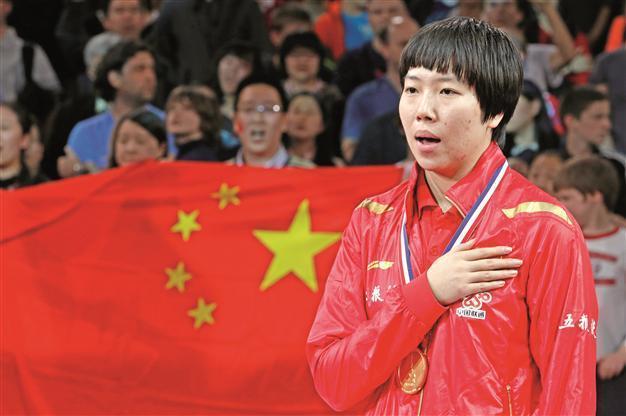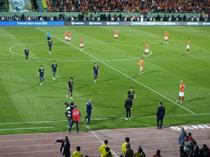Chinese athletes challenge system
SHANGHAI - Agence France-Presse

Li Xiaoxia of China listens to her national anthem on podium after her victory over compatriot Liu Shiwen in their women’s singles final at the World Team Table Tennis Championships in Paris on May 19. REUTERS Photo
In front of thousands of fans in a cavernous Shanghai stadium, long jumper Li Jinzhe thundered down the track before soaring 8.34 meters to victory, sending his supporters into a patriotic frenzy.Li is one of a new wave of foreign-coached track and field stars who are making China an emerging athletics force - but their independent attitude is putting pressure on the country’s intense state sports system to reform.
“It’s not a surprise. I expected to jump well,” said the 23-year-old after he beat a strong field including three previous Olympic champions at the Diamond League meeting earlier this month.
Under China’s rigid state sports system, many athletes believed to have potential are plucked from their families at an early age and put through grueling training regimes with little relaxation.
It was a system that helped China top the medals table at the 2008 Beijing Olympics with 51 golds.
But as the focus shifts to China’s next showcase sporting event, the 2015 World Athletics Championships in the capital, experts say that less intense foreign coaching schemes actually yield better results.
Li trains regularly in the US under Loren Seagrave, who has worked with a number of Olympic champions, including Canada’s 100m sprinter Donovan Bailey and women’s 200m winner Pauline Davis-Thompson, from the Bahamas.
Seagrave has also coached star Chinese sprinter Zhang Peimeng -- who broke China’s 200m record with a time of 20.47secs in Shanghai, only a month after he set a new national 100m mark in 10.04secs.
“Our training makes them experience a different culture from what they are used to, which forces them to open up, and this generates success,” Seagrave told AFP.
Zhang, 26, is now being lined up to be tutored by US coach John Smith, who has coached three Olympic gold medallists and the current 100m women’s world champion Carmelita Jeter, the second fastest woman of all time.
There are also plans to send China’s long distance runners to Kenya and Ethiopia for specialist training.
Nonetheless Beijing is keen to limit its emerging talents’ exposure to outside influences, fearing that it could create a generation of athletes who compete for their own interests, rather than national glory.
Dutch former long-distance runner Jos Hermens, who now works with the China Athletics Association, said: “Now they are more and more getting (foreign) coaches involved, other people internationally involved, so there is progress, slow progress.
Some of China’s biggest sporting stars already operate outside state control, most notably tennis player Li Na and 14-year-old golf prodigy Guan Tianlang.
Li won the 2011 French Open after she ditched the state system and recruited her own coaches, and privately-trained Guan became the youngest golfer ever to make the cut at a major tournament at the Masters last month. Li and Guan not only have the freedom to shape their own careers, they are also reportedly able to keep 65 percent of their winnings.
















